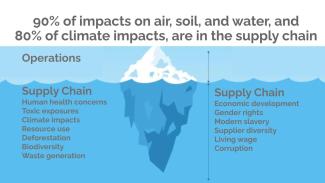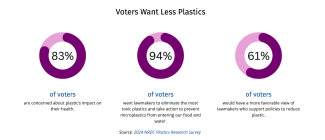Sustainable purchasing is fundamental to a healthy, prosperous, and resilient future. Sustainable purchasing can strengthen Michigan communities, support businesses, save money, and protect health and the environment.
The world is experiencing an unprecedented set of environmental and social challenges including a climate crisis, a pollution crisis, and a biodiversity crisis. Plastic pollution is now threatening ecosystems and human health. Residents of the State of Michigan confront these multiple environmental crises that threaten social stability, human and environmental health, and the economic fortunes of the State. All of these crises have roots in the materials we purchase and the energy we use.

Michigan’s climate plan lays out a pathway for Michigan to reach 100% carbon neutrality by 2050 to avert the worst impacts of the climate crisis, create good-paying jobs, and build a healthier and more prosperous, equitable, and sustainable Michigan for all Michiganders.
Michigan will not reach that climate goal without a focus on sustainable purchasing. On average, 70% of climate emissions are in the products governments purchase every day including making products and transporting, using, and disposing of them. Michigan also can’t reach climate goals without focusing on plastics reduction. Plastics are a large and growing use of fossil fuels, so the State can’t just focus on reducing fossil fuels used to make energy. The State also needs to focus on reducing fossil fuel use to make new plastics. Sustainable purchasing also offers one of the most powerful ways to address the plastics crisis.
By adopting policies to prioritize the purchase of products that protect health and the environment, we can help address some of the most difficult and intractable environmental and social problems. Buying products that reduce energy use, do not contain toxic chemicals, are made under safe, sustainable, and fair conditions, can be reused, and don’t deplete resources and ecosystems helps build a more resilient future for all. Buying local, sustainable, fairly produced goods and services also supports Michigan’s economy and prosperity.
The State has already recognized that the products and services it buys have inherent environmental and economic impacts and that it should make procurement decisions that embody, promote, and encourage the state’s commitment to being environmentally, socially, and fiscally responsible. For example, Michigan was one of the first states in the country to adopt a strong purchasing policy to eliminate PFAS, “Reducing State Purchases of Products Containing Intentionally Added PFAS.” For information on state PFAS policy, please see the SAFER PFAS Guide. The State should extend that commitment and adopt a strong policy to reduce other pollutants and greenhouse gas emissions through sustainable purchasing.
Voters want legislators to take action!
In a national poll taken by NRDC, voters clearly signaled their interest in action on plastics, one of the big product categories purchased by states. In order to address this concern, a strong statewide sustainable purchasing policy is necessary.

Cities, institutions, and states are taking action
Cities and states across the country and the world are implementing successful sustainable purchasing policies and commitments that accelerate the purchase of products that are less toxic and less fossil fuel intensive, while still performing equally well and often saving money, particularly when energy and waste disposal requirements are considered. Michigan should join them.
- Cities like Lansing and Ann Arbor and institutions like the University of Michigan have passed comprehensive sustainable purchasing policies and applied them to major contracts that offer a good roadmap for the state. They demonstrate that sustainable purchasing is not only possible, but necessary to address critical environmental and social issues and save taxpayer dollars.
- States like New York, Minnesota, Maryland, California, and many others have strong sustainable purchasing policies that have been demonstrated to save money, protect health, and preserve the environment.
Benefits of taking action
In addition to saving money, sustainable purchasing is a powerful tool for all kinds of benefits including:
- Supporting healthy communities and workforces
- Ensuring the safety of Michigan's land, air, and water
- Spurring economic development and creating good-paying jobs
- Protecting and improving the health of Michiganders
- Positioning Michigan as a leader in climate action and sustainability
- Protecting our natural resources and wildlife
- Addressing environmental injustices
- Reducing liability and risk
- Supporting the mission and values of the state
- Modeling best practices
- Supporting local businesses
- Demanding safer products to help drive the market toward more innovation and safer materials for the future
Solutions
Michigan should adopt proposed legislation to use the purchasing power of the State of Michigan to promote health, protect communities, advance equity, localize supply chains, support economic development, save money, address the climate, plastics, chemicals, and biodiversity crises, provide a model for local units of government, and preserve Michigan’s natural resources.
What should the legislation do?
The legislation should put existing Michigan executive actions related to sustainable procurement in statute, and strengthen others to mirror best practice. The legislation should support the State of Michigan’s goal to minimize negative impacts on human health and the environment while supporting a vibrant community and economy. In addition, it should set preferences for desirable sustainability attributes when procuring goods and services. It also should establish policies and procedures for acquiring, developing, maintaining, and using specifications for goods and services that align with the State’s goals. The legislation should provide incentives to communities with sustainable purchasing policies when competing for state grant funds.
The legislation should also:
- Empower State staff to be innovative and demonstrate leadership by incorporating progressive and best-practice environmental specifications, strategies, and practices in procurement decisions;
- Encourage vendors and contractors to promote products and services that are most suited to the State’s environmental, social, and fiscally responsible principles and encourage the development of environmentally preferable products and services;
- Complement existing State ordinances and policies; and
- Communicate the State’s commitment to sustainable procurement by modeling the best product and service choices to other local units of government, other states, and the private sector.
Anticipated outcomes of sustainable procurement legislation:
- Reduced occupational health hazards for State staff
- Reduced exposure of State residents and visitors to toxic chemicals
- Protected and improved air and water quality for Michigan residents and visitors
- Reduced greenhouse gas emissions, energy use, and resource consumption, and associated cost savings
- Reduced landfill waste and associated costs and liabilities
- Reduced use of toxic chemicals and associated costs and liabilities
- Alignment of State purchasing and use of materials, products, and services with the State’s fiscal, equity, environmental, climate change, toxics reduction, community, and performance goals
The following directives would be codified:
- Reducing State Purchases of Products Containing Intentionally Added PFAS
- Executive Directive No. 2021-8, October 27, 2021
- MI Healthy Climate Plan, April 2022
- The Management and Budget Act:
- State Procurements For Minority Owned And Woman Owned Businesses Act 428 of 1980
The policy would also:
- Create an Office of Sustainable Procurement jointly funded by EGLE, MEDC, and MDHSS; use third party certifications where applicable; and favor products manufactured by companies that take financial and/or physical responsibility for collecting, recycling, reusing, or otherwise safely disposing of their products and packaging at the end of their useful life.
- Offer potential opportunities for sustainable municipal procurement contracts to be bundled with state contracts.
Environmental factors to be considered in product and service acquisitions include:
- Pollutant releases and toxicants, especially Persistent Bioaccumulative Toxics (PBTs), other chemicals of concern, air emissions, and water pollution; Transparency and full disclosure of ingredients and product details; Waste generation and minimization; Greenhouse gas emissions; Recyclability and recycled content; Energy consumption, energy and fuel efficiency, and use of renewable energy; Depletion of natural resources; Potential impact on human health and the environment; Impacts on biodiversity; Manufactured locally and/or locally sourced; Life cycle impacts and costs considered, including impacts on worker health and and safety and community impacts; Total cost of ownership or ‘value for money procurement’ instituted; Product durability, reusability and long-term performance considered; environmental performance of vendors.


